|
|
|
Sort Order |
|
|
|
Items / Page
|
|
|
|
|
|
|
| Srl | Item |
| 1 |
ID:
141848
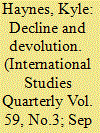

|
|
|
|
|
| Summary/Abstract |
This paper offers a theory of military retrenchment by states in relative decline. I argue that a declining state will choose to withdraw foreign military deployments and security commitments when there exists a suitable regional “successor” to which it can devolve its current responsibilities. The degree of a successor's suitability and the strategic importance of the region to the declining state interact to determine when and how rapidly retrenchment will occur. Importantly, this devolutionary model of retrenchment predicts significant variations in retrenchment patterns across a declining state's multiple regional commitments. It advances the literature by producing nuanced predictions of precisely where, when, and how quickly retrenchment will occur. This paper assesses the theory empirically through an examination of Great Britain's varying regional retrenchment strategies prior to World War I.
|
|
|
|
|
|
|
|
|
|
|
|
|
|
|
|
| 2 |
ID:
146198
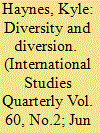

|
|
|
|
|
| Summary/Abstract |
How does a state’s ethnic composition affect its propensity to engage in diversionary conflicts? Recent empirical work examines the political conditions under which domestic unrest compels an embattled leader to initiate conflict abroad. We remain uncertain, however, of what social or demographic characteristics make states particularly prone to diversionary behavior. This article tries to address this gap, examining whether a state’s ethnic structure conditions its leader’s response to domestic discontent. Combining the expansive literatures on ethnic politics and diversionary war yields conflicting expectations here. I find that ethnically fragmented states are significantly more prone to initiating diversionary conflicts, and I show that the greater availability of “conflict opportunities” resulting from transborder ethnic-kin groups, in part, drives this effect. A brief case study illustrates these dynamics.
|
|
|
|
|
|
|
|
|
|
|
|
|
|
|
|
| 3 |
ID:
115201
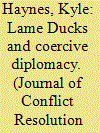

|
|
|
|
|
| Publication |
2012.
|
| Summary/Abstract |
The literature on "audience costs" in International Relations suggests that a democratic leader's electoral accountability lends him or her a significant advantage in crisis-bargaining situations. But if elections are the primary source of a democratic leader's accountability, a democracy's advantage in crisis situations should disappear when its leader is no longer eligible for reelection. Accordingly, this article asks whether "lame-duck" presidents, those who are constitutionally prohibited from reelection, are systematically less effective than their reelectable counterparts in crisis-bargaining situations. Using a data set of all post-World War II militarized interstate disputes initiated by presidential democracies, the author tests several hypotheses regarding lame-duck crisis behavior derived from Fearon's bargaining model. The findings generally support the audience costs model. Observed patterns of threat reciprocation and crisis hostility are consistent with Fearon's predictions. Crisis outcomes, however, do not appear to be affected by a democratic leader's lame-duck status.
|
|
|
|
|
|
|
|
|
|
|
|
|
|
|
|
| 4 |
ID:
168281
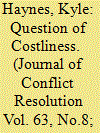

|
|
|
|
|
| Summary/Abstract |
This article examines how interstate signaling processes operate under multiple dimensions of uncertainty. The existing signaling literature largely assumes that states communicate and infer one another’s intentions in a simplified context where they are only uncertain about one component of the other’s preferences. Relaxing this unrealistic assumption, I develop a model of interstate reassurance in which the receiver is uncertain of both the compatibility of the sender’s goals and its time horizons. If a receiving state is unsure of the sending state’s time horizons, it is more difficult to determine the costliness of a given signal, and thus how credible it is as an indicator of the sender’s preferences. I show that under certain conditions, shorter time horizons lead to more credible signaling as states become less willing to incur the short-term costs of misrepresentation. Under other conditions, however, shortened time horizons can incentivize hedging behavior, thus undermining a benign state’s ability to credibly signal its intentions. Finally, the model reveals that multidimensional uncertainty can actually facilitate cooperation across a wider range of conditions than one-dimensional uncertainty. I present two brief case illustrations and discuss the model’s implications for contemporary US–China relations.
|
|
|
|
|
|
|
|
|
|
|
|
|
|
|
|
| 5 |
ID:
178206
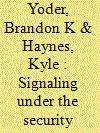

|
|
|
|
|
| Summary/Abstract |
One of the most intractable debates in IR revolves around the severity and frequency of the security dilemma. Offensive realists argue that states are compelled to make worst-case assumptions about each other’s intentions, which yields inexorable competition and conflict even between mutually-benign actors. Yet others have argued that rational benign states should always be able to find cooperative signals that are costly enough to be credible, but not too costly to risk sending. If true, this should alleviate the security dilemma and facilitate cooperation, even under high initial distrust. However, there is little empirical work on interstate reassurance and the conditions under which mutually-benign actors can build trust. We address this gap using laboratory experiments to test Andrew Kydd’s canonical model of the security dilemma. We find strong support for the directional effects of the hypothesized signaling mechanisms. However, the frequency of cooperation is significantly lower than the model predicts, and the feasibility of reassurance is highly sensitive to the degree of prior trust. This implies that although reassurance can mitigate the security dilemma, offensive realism may still capture important psychological mechanisms that impede interstate cooperation.
|
|
|
|
|
|
|
|
|
|
|
|
|
|
|
|
| 6 |
ID:
141830
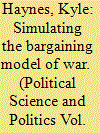

|
|
|
|
|
| Summary/Abstract |
This article outlines a classroom simulation for teaching the bargaining model of war. This model has become one of the most important theories of international conflict, but the technical notation often used to illustrate it is troublesome for some students. I describe a simple card game that can be integrated into a broader strategy for conveying the bargaining model’s core insights. I also highlight ways in which the game can be modified to focus on different aspects of the model’s logic.
|
|
|
|
|
|
|
|
|
|
|
|
|
|
|
|
|
|
|
|
|